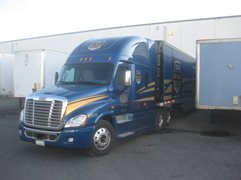

We all know that there are 24 hours in a day. Each of us lives by 7 days per week and 365 days a year. How will we manage to spend all that time?
We all go to great lengths to save time by utilizing modern conveniences. Today, we have the microwave, automatic dishwasher, blow dryer, garage door opener, electric wash machine/dryer, electric vacuum, cordless phones and many other time saving devices. The farmer even has a tractor instead of a horse to plow the fields. Modern day airplanes, ships, cars and trains have cut travel time immensely. The internet has made mail and other communication convenient and all but instant.

When it comes to the transportation industry, the US Highway and Interstate Highway System cut transportation time and made the industry possible. Years ago, it took many hours, days, weeks and months to travel around the country. Today’s hours of service rules require drivers to stay under 70 hours in 8 days or 60 hours in 7 days. Drivers can work fourteen hours per day, drive eleven of those hours and we are even required to take a half an hour break before hitting our eight hour on duty. All the regulations add up to make time a valuable commodity in the transportation industry.
Throughout my years in this business, I’ve always heard driver’s complain that our time is not valued. So much

time is wasted at the dock attempting to get loaded /unloaded in a timely manner. When shippers/consignees aren’t prepared or organized, it greatly affects a driver’s time. Waiting for a dispatcher to assign a shipment can take away time as well. Traffic jams, road construction, fuel islands and wash bays also combine to take away hours. Unfortunately, all of these unpaid hours result in drivers taking it upon themselves to hide much of this time. Today, there is a lot of pressure to make drivers and carriers accountable for their time. The pressure is on to mandate electronic onboard recorders also known as electronic logging devices. These are being pushed into the industry as a safety device however I don’t feel they will do much for highway safety. I understand the danger of a fatigued driver operating a motor vehicle down the highway and we can all agree that this is a risky practice. Many studies have compared fatigued driving to drunk driving as both of these hamper your reaction and decision making abilities. I remember when split logging was legal and we weren’t under the fourteen hour clock, many drivers would park or sit out during high density traffic hours. I’m sure there are still drivers operating this way but logging it differently on paper. The other issue regarding the fourteen hour clock (which stops for nobody) discourages drivers from taking a nap or sitting out during bad weather or traffic conditions. In regards to safety, the electronic recording and fourteen hour rule causes as many problems as they solve. I truly believe the FMCSA envisioned the fourteen hour rule as a way to combat the detention issues that drivers face at the dock. The FMCSA has no authority over shippers and consignees yet realized that detention time is a major fatigue issue. The thought behind the fourteen hour rule seemed to be if the FMCSA took away our ability to make up for the delays incurred at the shippers and consignees, the practice of detaining drivers would be eliminated. While the intention of the fourteen hour rule may have been good, it really didn’t fix many driver detention issues.
In my opinion, as I stated earlier, the correlation between safety and EOBR’s/ELD’s is minimal at best. However, there may be a positive side to these intrusive devices. Let’s just imagine if tomorrow everybody woke up and magically had an electronic log in their truck. I don’t think we would require coffee to wake up that particular morning! Let’s imagine also on this mystical morning that dispatchers and shippers alike are going about their business as normal. All the routine lack of regard for driver time would be going on as usual. By day two a shock wave would be rolling through the shipping community with more affect than any “strike” could accomplish. Shippers would be calling dispatch wondering where their shipments are. Dispatchers would be calling drivers and asking why didn’t you make it to your destination? Here’s the beauty…the driver would simply respond to dispatch saying “I was out of hours.” The EOBR would also begin to quickly affect the supply side of transportation causing there to be a driver shortage. Whenever supply and demand is affected in this manner, rates should begin to rise.
Maybe… just maybe after all these years, the EOBR might be the agent of change that finally addresses the issue of time and its value to each driver. Just something to think about…perhaps we might be able to make lemonade out of what appears to be lemons.